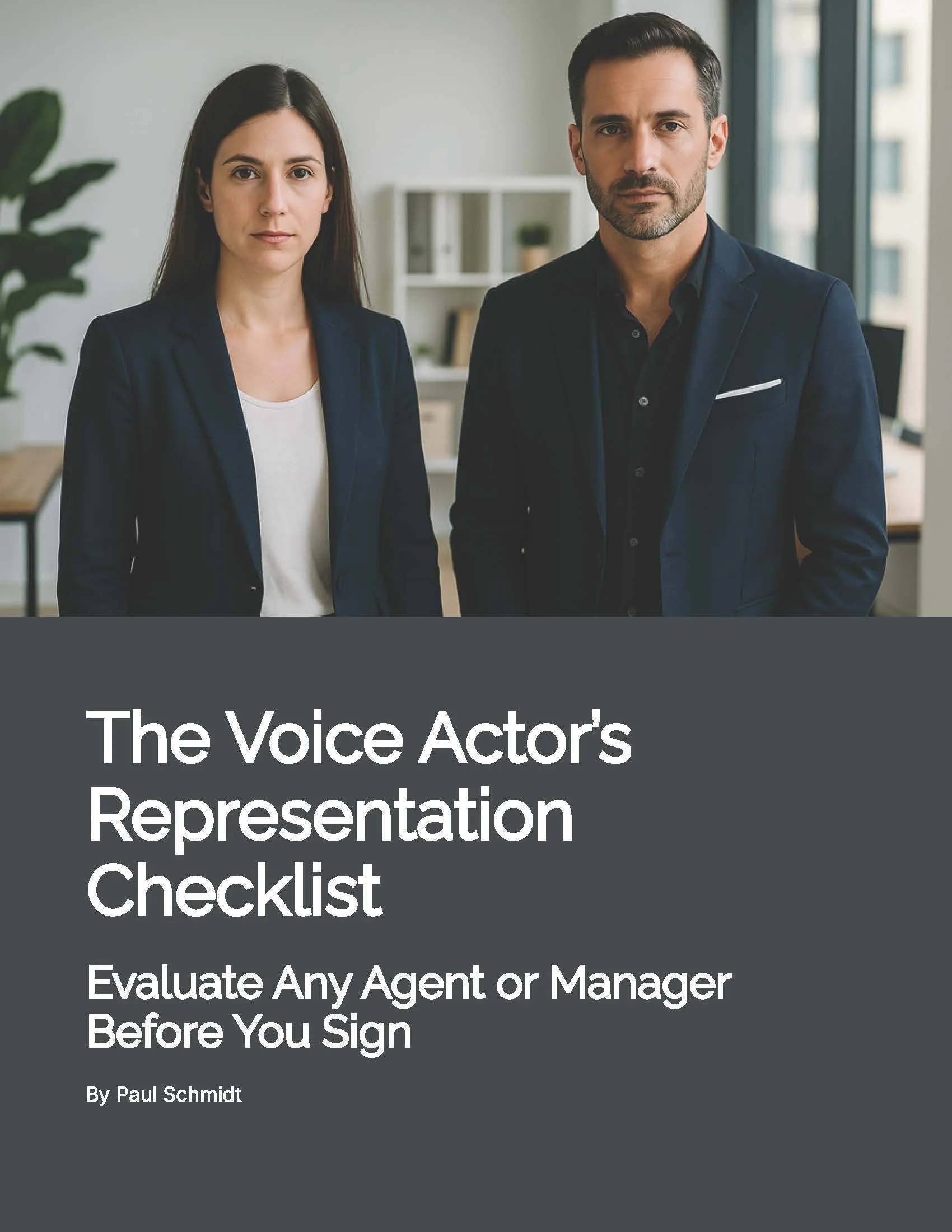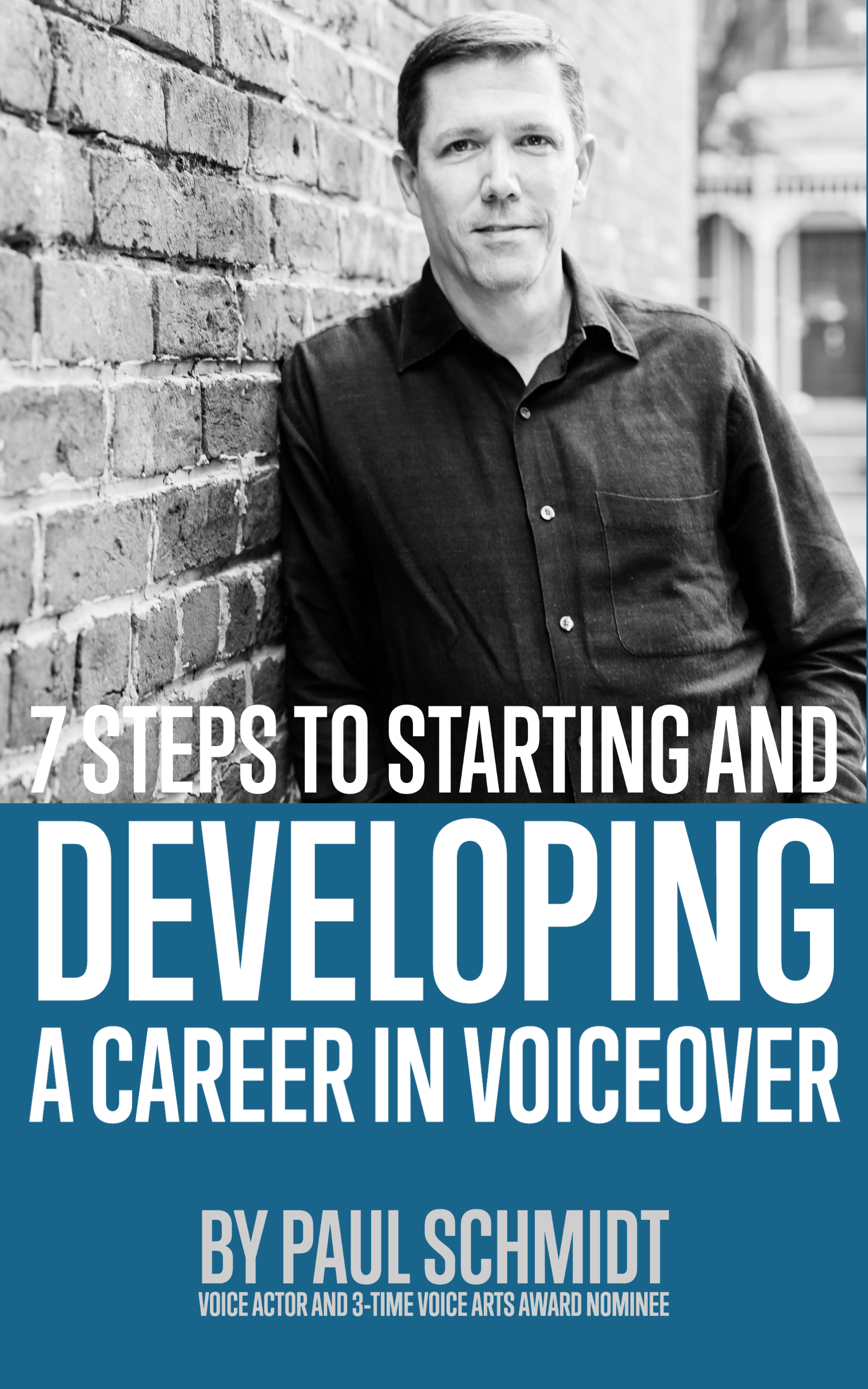The Top 3 Worst Sites For Voice Over Work
Alright. Here are the top three worst websites for voice over work. A list of the three worst websites to find voice over jobs, including the worst web sites for your voice over career and the three worst free sites for voiceover jobs. I'm Paul Schmidt, a voice actor and voice business coach. Nobody starts out looking for the worst places to find voice acting work.
But if you're going to look for the best voiceover websites to find voice acting jobs online, it's also useful to know the voiceover websites to avoid and more importantly, why they're sketchy at best.
The Rise of Online Casting
Okay. During the first few years of your voice over career, it's really easy to get overwhelmed by all the sites online in which you can find work, both free sites and paid sites.
It seems like there are new sites coming online weekly now. In 2003, the two 800-pound gorillas in the business voices.com and voice123 were both founded. Ten years later, sites like Fiverr and Voice Bunny came on the scene, and a few years later, sites like Upwork and a myriad of others. The ability to find work online has upended the entire voiceover industry.
For decades, voice over work was almost exclusively cast through casting directors and talent agents. But technology has changed all that. So in a lot of genres now, online casting sites are now competing next to or have replaced casting directors and talent agents as the middle people. And they control a ton of voice over work. And in a lot of ways, this democratized the industry.
Remember, technology also changed who was seeking voice actors. It wasn't just large companies anymore. Companies of all sizes were producing their own content and didn't always know how to find professional voice actors, how to engage with us, how to work with us, or what we cost. More importantly, clients who were producing work in-house didn't always want to go through the complexity of hiring and working with union talent.
The Rise of the Non-Union Voice Actor
So there's a lot more non-union freelance voiceover work than there was, let's say, even at the turn of the century. As a result, over the last 20 years, we've seen the rise of the freelance non-union voice actor. We now have the ability to look for and find work online in a way that we didn't have a generation ago.
And that has opened up the industry to a vastly larger number of voice actors coming into the business. So now here we are in the 2020s with a multitude of online, both free and paid casting sites. So the question becomes, how do you know the difference? How do you separate the good from the bad? For that, you first have to look at voice acting as a business.
Jobs vs. Clients
Strategically, you have two paths you can go by. You can look for jobs or you can look for clients. A job is a single piece of work that you do at a single point in time. It's transactional. It's a one and done.
It's the one night stand of voiceover. "Thank you very much. You were fantastic. Leave the money on the dresser. Call me!"
A client, however, is a long term relationship. At first you start with courtship where you flirt for a while. "No, you hang up! No, you!" Then someone asks the other out on a date. And if that goes well, there's another date. And then another. And then another. You learn about each other. You learn your likes, dislikes, you learn how the other operates.
You come to understand what each other are all about. You both are seeing other people, but that's okay because this is a flimsy-ass metaphor and we're really talking about business. When I started my voice acting career, I made the conscious decision to own as many of my relationships as possible with my clients. Clients mean recurring work, not always regular work, but often.
I have some sporadic clients. I have clients that come to me every month. I have some clients that come to me once a quarter. I have some clients that come to me a couple of times a year, and then I have clients that come to me annually once a year, like clockwork. We are in a relationship, literally. We're there to meet their needs, whatever they may be, and thereby strengthen the relationship.
But the reality is your work will always be a mix of clients and jobs throughout your career. The cogent point, though, is that a professional client is worth a hell of a lot more than a job because a professional client means good work recurring over time. And secondly, if we're going to squeeze all the juice out of this flimsy dating metaphor, you don't want to be out there looking for twos, threes, and fours.
You want to be working with 8s, 9s, and occasionally 10s. You want professional clients that know what they're doing and value what we do as professionals. 2s and 3s and 4s are needy and clingy and high maintenance and they will suck the life and the joy right out of you. You offer them the moon. They want the sun, the stars, the planets, the comets, any cutdowns, lifts, and they want it all in perpetuity.
8s, 9s, and 10s are low maintenance. They know exactly what they want and they are more than willing to pay professional rates for quality experience. Now, I tell you all that to tell you this online casting sites, both free and paid, are still the wild, wild west of voice over. There's the good, the bad and the ugly. Some are paid, some are free to voice actors.
Some condone developing relationships with clients. Others bend over backward to keep the talent and clients separated so that they can be the middle people and control the flow of the work and the money. So let's get into the ugly.
the top three worst websites for voiceover work
Think of it as the “who let the dogs out” of voiceover.
Number three: Bunny Studio, formerly Voice Bunny.
What started out as a side project of Voice123 became Voice Bunny.
They rebranded a few years ago as Bunny Studio. You do get to set your own rates on Bunny Studio no matter what the genre. Bunny Studio rates are broken out per word for 5, 50, 500, 5000, and 50,000 words regardless of genre. And that's the big problem. Advertising, commercials, for example, should never be based on word count.
Certainly not at tiers of 5 and 50 words. Commercials come in standard lengths of 6, 10, 15, 30, and 60 seconds. And even then, that's not how they're priced. Professional GVAA rates are not based on word count or spot length. They're based on the medium TV, radio, digital geography, local or regional, national, worldwide, and most importantly, how long the spots run.
13 weeks, 26 weeks a year, 2 years. Commercials and any paid placement work should never be a flat rate per word and licensed in perpetuity. Standard non-broadcast work is also not based on a flat rate per word, it's based on a sliding scale, based on the length of the script. Now you might be saying, "Well, Paul, that's a very subtle difference," and you're right, but if you don't know the difference and if you don't structure your rates properly, you could be leaving hundreds or thousands of dollars on the table over the course of your career.
So Bunny Studio is clearly aimed at talent and clients who don't know or care really how professional rates are structured and how they work. These are the 2, 3s, 4s, and 5s of voice over jobs. They're high maintenance and they're low long-term value. You're better than that. You should be working with 7s, 8s, 9s, and 10s. You've been training.
You've been working out. You sound good. You look fabulous. You could get a ten!
Site Number Two: Upwork.
Upwork is a general freelance job board that was not designed or aimed to target the voiceover industry. As such, it's just not aimed at talent who take their voice over business seriously. Long-term, high-value clients simply don't use sites like this to find professional voice talent.
Rates are mostly bottom of the barrel and not for professionals. Look, if you're a hobbyist or amateur and you're just looking to make a few bucks and have a little fun, I fully support you doing that. And sites like Upwork are great for that kind of activity. But if you're going to be a professional run away! Run away!
And Number One, Fiverr.
Fiverr is also not targeted specifically at the voiceover industry, but because of its size and popularity, it controls a huge amount of voiceover work. There's no doubt about that. There are people that will tell you that you can do six figures online doing voiceover work on Fiverr. And I do not doubt that there is a massive amount of work to be had there.
But just like Upwork, Fiverr is not concerned with or designed for the best interests of the voice actor clients can ask for literally anything, any usage, any term at any budget with no rules or structure around that and voice actors, especially newer talent, take what they're offered, often to their financial detriment. They don't often know or care what pro rates are and are simply out to win as many jobs as they possibly can for whatever they can get.
Some a few absolutely do make six figures on Fiverr. But here's the thing. They often leave tens or hundreds of thousands of dollars on the table because they either don't care or they don't know how to structure their rates and quotes properly for the usage and the scope of the work that they're really doing. More importantly, if you consider yourself a professional and you value your reputation in the business and you will eventually one day want to work with high-value clients, national brands, Fortune 500 companies, large professional ad agencies, reputable talent agents.
Many will not work with a talent that has a Fiverr account. They know that person doesn't take themselves or their work seriously and they probably don't have the chops or the training to be able to compete in the grown-up pool. You can literally endanger your professional reputation and your career in the long term by working on Fiverr.
There's a great example of this in the article "Why I Don't Worry About Fiverr Anymore." Read that article. It's quite eye-opening.
It’s Your Business
Look, in the end, it's your business. You get to pick how you set your rates. You get to decide what kind of clients you want to work with and how you want to do business.
My best advice is that you chase clients over jobs whenever possible and that you go after 7s, 8s, 9s, and 10s and avoid the 2s, 3s, 4s, and 5s. My mission is to help voice actors in their careers by teaching them a system to find work more consistently by growing client relationships at scale that lead to more consistent work, income and revenue.
If you want more info on that, click the VO Freedom Master Plan link. And if you found this video and the channel helpful, help spread the word to other voice actors. Make sure you like, subscribe, and most importantly, hit that notification bell so that you'll be the first to know when we publish a new video every Thursday.
We'll see you soon. Thanks for reading!


